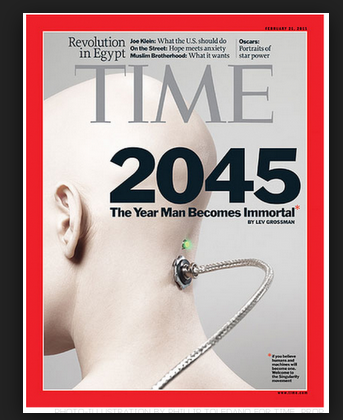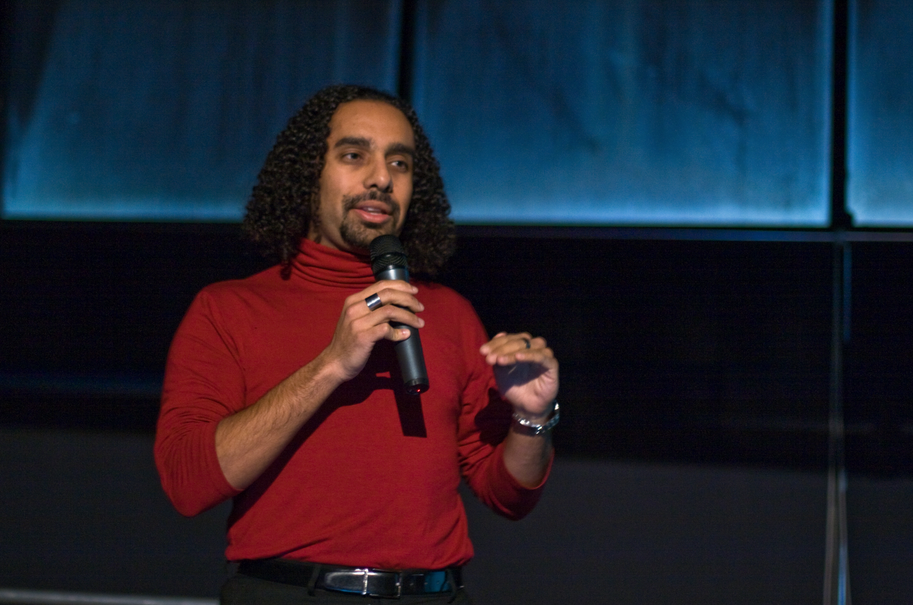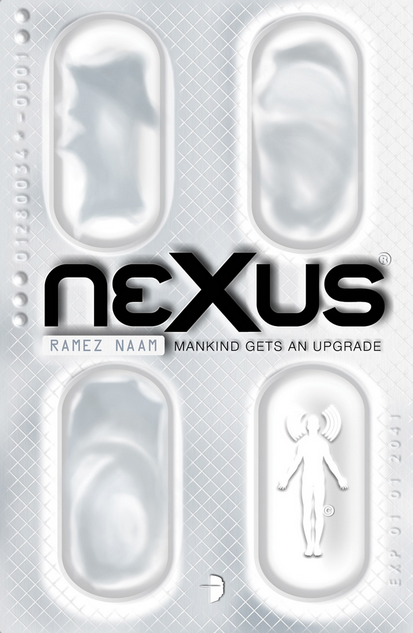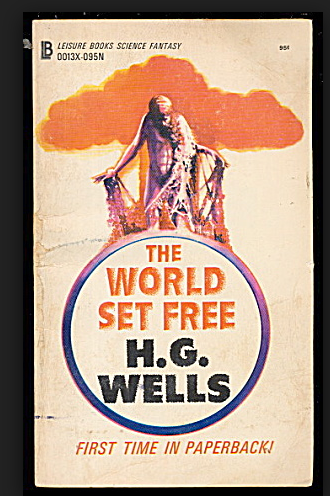Worlds Set Free
 When NPR made its Best Books of 2013 list, I was happily surprised to find Ramez Naam's debut novel Nexus on it. Subtitled, Mankind Gets an Upgrade, the book's back matter describes its author as a "professional technologist," a former CEO of "Apex Nanotechnologies" who "holds a seat on the advisory board of the Institute for Accelerating Change" and other Silicon Valley-based tech affiliations.
When NPR made its Best Books of 2013 list, I was happily surprised to find Ramez Naam's debut novel Nexus on it. Subtitled, Mankind Gets an Upgrade, the book's back matter describes its author as a "professional technologist," a former CEO of "Apex Nanotechnologies" who "holds a seat on the advisory board of the Institute for Accelerating Change" and other Silicon Valley-based tech affiliations. Given my experience in writing about visioneers, Ramez Naam seemed like my kind of person. Moreover, Naam was born in Cairo before coming to the U.S. when he was three. The visioneers I've written about fit a standard (and too restricted) demographic - white males who attended elite American schools - so Naam's background was all the more intriguing. So - I bought the book and took the wild ride.The world that Naam constructs in Nexus sits on the verge of a dystopian future. But it never quite falls into the abyss. At its heart is the question of whether humans should be allowed to augment themselves with chemical, nanomachines, computer implants, and so forth. Those who choose to do so will emerge from the crucible as a posthuman. As Naam defines it, via a fictional entry from the 2036 edition of the OED, a posthuman is a "being which has been so radically transformed by technology that it...can no longer be considered human at all."
Given my experience in writing about visioneers, Ramez Naam seemed like my kind of person. Moreover, Naam was born in Cairo before coming to the U.S. when he was three. The visioneers I've written about fit a standard (and too restricted) demographic - white males who attended elite American schools - so Naam's background was all the more intriguing. So - I bought the book and took the wild ride.The world that Naam constructs in Nexus sits on the verge of a dystopian future. But it never quite falls into the abyss. At its heart is the question of whether humans should be allowed to augment themselves with chemical, nanomachines, computer implants, and so forth. Those who choose to do so will emerge from the crucible as a posthuman. As Naam defines it, via a fictional entry from the 2036 edition of the OED, a posthuman is a "being which has been so radically transformed by technology that it...can no longer be considered human at all." From this stems much of the novel's tension. On one hand, there those people who wish to hack their own biology (and perhaps that of others around them) so as to transcend their humanity. A few of these characters are unsavory, venal people who only seek profit and power. The majority are well-meaning, good-looking people in their mid-20s with superior intellects who see the passage to posthumanism as a form of evolution, augmented and accelerated to be sure.Not surprisingly, those opposing them - to the extent of stripping posthumans of legal and human rights - are shadowy government agencies who see people augmented with emerging technologies as an emerging threat. Naam's exposition reflects current oppositional views toward trans/posthumanism which is, as I've remarked, one of the relatively few areas in contemporary science where the left and the right-wing agree.The basic plot: It's 2040 and new technologies for human augmentation include cloning, mind control software, nanotechnologies, and drugs that allow the creation of a hive mind. (Naam's scenes fell somewhere between a vigorous tantric yoga system and a molly-fueled rave at Burning Man). Central to this is the drug Nexus which, thanks to the efforts of Kaden Lane, a smart but naive doctoral student (is there any other kind?), has been upgraded into a form of mind-linking technology. Lane imagines the new Nexus will make a path to enlightenment, societal understanding, human enhancement (and perhaps an enhanced ability to bed sexy nerds)...but the duplicitous Emerging Risks Directorate sees only an unacceptable threat. Add to the mix some omnipresent surveillance, biologically improved martial arts fighters, and a cloned army of elite Chinese soldiers. ((Much of the book unfolds in Thailand, an unconventional move in terms of setting that was perhaps inspired by Paolo Bacigalupi's excellent The Windup Girl.)) Nexus isn't a bad book. Some of the dialogue is quite anodyne and readers might be put off by the level of tech speak that permeates the book. (Others might find this gives an even thicker veneer of verisimilitude.) The plot chugs right along though, enough to entertain me for a flight between JFK and LAX.At the book's end, however, what made Nexus worth reading wasn't so much Naam's prose but his plumbing of prevailing ideas about technology today. Good sci-fi offers a window into the time in which it's written and Naam succeeds at this. His exploration of the implications that the technologies undergirding posthumanism might bring were provocative without veering off (at least not too often) into waters that were over-churned with philosophical musings. The plot and characters serve more as vehicles for Naam to put forth his own ideas about the risks and benefits of human enhancement technologies. Not surprisingly, given his profession of technologist and futurist, he is enthusiastic. But it's an excitement tempered with some severe reservations.
From this stems much of the novel's tension. On one hand, there those people who wish to hack their own biology (and perhaps that of others around them) so as to transcend their humanity. A few of these characters are unsavory, venal people who only seek profit and power. The majority are well-meaning, good-looking people in their mid-20s with superior intellects who see the passage to posthumanism as a form of evolution, augmented and accelerated to be sure.Not surprisingly, those opposing them - to the extent of stripping posthumans of legal and human rights - are shadowy government agencies who see people augmented with emerging technologies as an emerging threat. Naam's exposition reflects current oppositional views toward trans/posthumanism which is, as I've remarked, one of the relatively few areas in contemporary science where the left and the right-wing agree.The basic plot: It's 2040 and new technologies for human augmentation include cloning, mind control software, nanotechnologies, and drugs that allow the creation of a hive mind. (Naam's scenes fell somewhere between a vigorous tantric yoga system and a molly-fueled rave at Burning Man). Central to this is the drug Nexus which, thanks to the efforts of Kaden Lane, a smart but naive doctoral student (is there any other kind?), has been upgraded into a form of mind-linking technology. Lane imagines the new Nexus will make a path to enlightenment, societal understanding, human enhancement (and perhaps an enhanced ability to bed sexy nerds)...but the duplicitous Emerging Risks Directorate sees only an unacceptable threat. Add to the mix some omnipresent surveillance, biologically improved martial arts fighters, and a cloned army of elite Chinese soldiers. ((Much of the book unfolds in Thailand, an unconventional move in terms of setting that was perhaps inspired by Paolo Bacigalupi's excellent The Windup Girl.)) Nexus isn't a bad book. Some of the dialogue is quite anodyne and readers might be put off by the level of tech speak that permeates the book. (Others might find this gives an even thicker veneer of verisimilitude.) The plot chugs right along though, enough to entertain me for a flight between JFK and LAX.At the book's end, however, what made Nexus worth reading wasn't so much Naam's prose but his plumbing of prevailing ideas about technology today. Good sci-fi offers a window into the time in which it's written and Naam succeeds at this. His exploration of the implications that the technologies undergirding posthumanism might bring were provocative without veering off (at least not too often) into waters that were over-churned with philosophical musings. The plot and characters serve more as vehicles for Naam to put forth his own ideas about the risks and benefits of human enhancement technologies. Not surprisingly, given his profession of technologist and futurist, he is enthusiastic. But it's an excitement tempered with some severe reservations. What Nexus reminded me most of all was H.G. Wells' classic 1914 book The World Set Free. Like Naam's book, Wells' was inspired by rapid advances in technoscience - in Wells' case, these were the recent discoveries in physics. Wells dedicated his book to British chemist Frederick Soddy who, along with Ernest Rutherford, had discovered atomic transmutation. Soddy popularized his musings on what the new sciences of radioactivity and nuclear physics might be able to do in his 1909 book The Interpretation of Radium. Wells' book was especially prescient for its prediction of the first nuclear weapons. Fueled by something Wells called "Carolinium" these "atomic bombs which science burst upon the world that night," Wells wrote, "were strange even to the men who used them." Carnage ensues. ((Wells' book is also famous for helping, in 1932, inspire the Hungarian émigré physicist Leo Szilard conceptualize the possibilities and dangers of nuclear energy.))Like Wells' The World Set Free, Nexus is a cautionary tale. But what is it cautioning us about? Yes, Naam presents the dangers of rampant human enhancement via chemical, computer, and nanotechnologies are there. Their most damning capacity is not their ability to destroy but to coerce and Naam conjures some chilling scenes to depict this. Naam's thriller clearly extrapolates existing techno-trends and his depiction of a pervasive and intrusive surveillance state is all the more relevant given the near-daily revelations about years of National Security Agency abuses, on-going debates about autonomous vehicles et al.. One doesn't have to be some wild-eyed futurist to see some merit in the warnings Nexus sounds. Five years ago, my colleague Michael Bess, a historian at Vanderbilt University, published an excellent article that detailed the challenges that human enhancement technologies pose, not in 2040, but now. ((Michael D. Bess, “Icarus 2.0: A Historian's Perspective on Human Biological Enhancement,” Technology and Culture, 2008, 49, 1: 114-26. Bess has a new book soon to appear entitled Superhuman Civilization: Justice and Identity in a Bioengineered Society. According to his web site, it "explores the ethical and social implications of new technologies for human biological enhancement. These technologies, which reconfigure or boost our physical and mental capabilities, are developing rapidly in three distinct but interconnected domains: pharmaceuticals, bioelectronics, and genetics."))Naam wrote Nexus a century after Wells' composed The World Set Free. But what and who is being set free? Wells' ended his book by having the world spared through the actions of enlightened scientists who form a one-world government. A new social order, an all-encompassing but benevolent one based on technocratic rationalism would free the world from conflict.At the end of Nexus, however, the techno-geeks - loosely connected members of an atomized society who espouse a pretty standard sort of techno-libertarian-utopianism - appear triumphant. Unfettered to evolve onward and upward, the Nexus-eaters have been set free from themselves. But - more revealing - they have freed themselves from government. They have improved themselves...but did society as a whole benefit? ((For curious readers, Naam has a sequel. Crux picks up the story roughly where Nexus left us and follows the characters and the implications of their actions.))
What Nexus reminded me most of all was H.G. Wells' classic 1914 book The World Set Free. Like Naam's book, Wells' was inspired by rapid advances in technoscience - in Wells' case, these were the recent discoveries in physics. Wells dedicated his book to British chemist Frederick Soddy who, along with Ernest Rutherford, had discovered atomic transmutation. Soddy popularized his musings on what the new sciences of radioactivity and nuclear physics might be able to do in his 1909 book The Interpretation of Radium. Wells' book was especially prescient for its prediction of the first nuclear weapons. Fueled by something Wells called "Carolinium" these "atomic bombs which science burst upon the world that night," Wells wrote, "were strange even to the men who used them." Carnage ensues. ((Wells' book is also famous for helping, in 1932, inspire the Hungarian émigré physicist Leo Szilard conceptualize the possibilities and dangers of nuclear energy.))Like Wells' The World Set Free, Nexus is a cautionary tale. But what is it cautioning us about? Yes, Naam presents the dangers of rampant human enhancement via chemical, computer, and nanotechnologies are there. Their most damning capacity is not their ability to destroy but to coerce and Naam conjures some chilling scenes to depict this. Naam's thriller clearly extrapolates existing techno-trends and his depiction of a pervasive and intrusive surveillance state is all the more relevant given the near-daily revelations about years of National Security Agency abuses, on-going debates about autonomous vehicles et al.. One doesn't have to be some wild-eyed futurist to see some merit in the warnings Nexus sounds. Five years ago, my colleague Michael Bess, a historian at Vanderbilt University, published an excellent article that detailed the challenges that human enhancement technologies pose, not in 2040, but now. ((Michael D. Bess, “Icarus 2.0: A Historian's Perspective on Human Biological Enhancement,” Technology and Culture, 2008, 49, 1: 114-26. Bess has a new book soon to appear entitled Superhuman Civilization: Justice and Identity in a Bioengineered Society. According to his web site, it "explores the ethical and social implications of new technologies for human biological enhancement. These technologies, which reconfigure or boost our physical and mental capabilities, are developing rapidly in three distinct but interconnected domains: pharmaceuticals, bioelectronics, and genetics."))Naam wrote Nexus a century after Wells' composed The World Set Free. But what and who is being set free? Wells' ended his book by having the world spared through the actions of enlightened scientists who form a one-world government. A new social order, an all-encompassing but benevolent one based on technocratic rationalism would free the world from conflict.At the end of Nexus, however, the techno-geeks - loosely connected members of an atomized society who espouse a pretty standard sort of techno-libertarian-utopianism - appear triumphant. Unfettered to evolve onward and upward, the Nexus-eaters have been set free from themselves. But - more revealing - they have freed themselves from government. They have improved themselves...but did society as a whole benefit? ((For curious readers, Naam has a sequel. Crux picks up the story roughly where Nexus left us and follows the characters and the implications of their actions.))